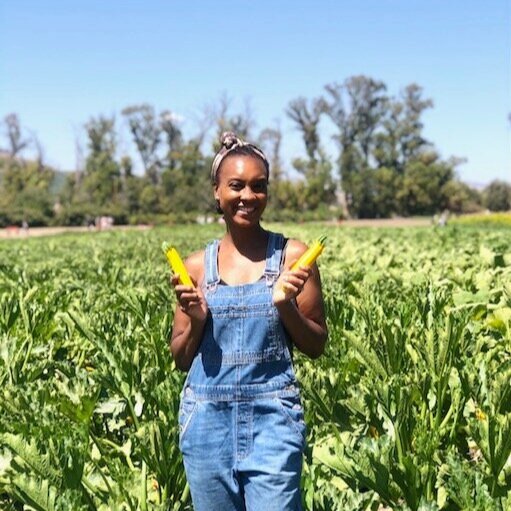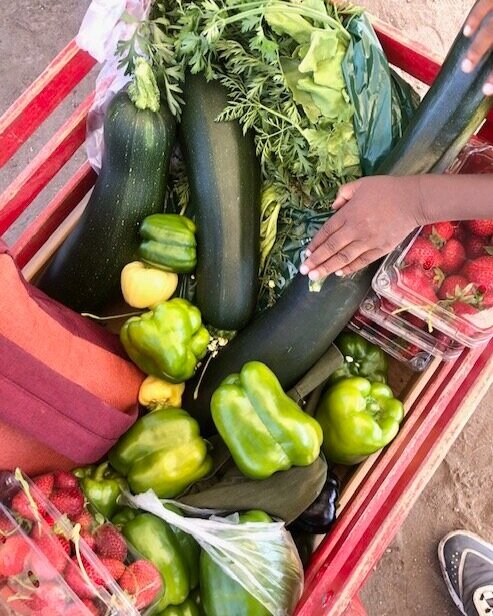The Truth Behind Buying Organic Food
Picking fresh vegetables at Underwood Family Farms, a sustainable farm in Moorpark, California.
Did you know that U.S. agricultural standards only require certified organic foods to be 60% organic?
Dr. K of Keasberry Health Center shared this interesting fact with me when I interviewed her about how busy moms can invigorate their family’s holistic health. What does 60% organic mean? It means that sometimes when you’re buying organic food from the grocery store, it’s not really 100% pesticide free. “So imagine if you’re not getting organic!” Dr. K said.
In certain circumstances, organic farmers can still use pesticides that come from natural substances.
Chemical pesticides are also preexisting in some environments and make their way onto organic properties, from neighboring non-organic farms. “It’s hard to eliminate them completely, even in the organic system,” Miles McEvoy, a former administrator of the National Organic Program, explained. In fact, a USDA study looked at a sample of domestic and imported organic produce, and found that 39% of it contained pesticides.
Fruit and veggies that we picked at the farm
Buying imported organic foods can also be tricky, as there’s no barometer for tracking organic requirements outside of the U.S.
“Nobody from America is checking farms in other countries to make sure they’re certified,” John Bobbe, executive director of the Organic Farmers Agency for Relationship Marketing, said. He told the NYC Food Policy Center, that when imported produce arrives in the states, it may not actually be organic by American standards. Popular imported organic goods include coffee, bananas, corn, soybeans, and olive oil.
While buying organic does not totally safeguard you from icky pesticides, it does significantly reduce it.
The NYC Food Policy Center found that 82% of U.S. households regularly purchase organic food. AND better news—studies say that people who eat large quantities of organic food can reduce their risk of cancer.
My daughter, discovering broccoli crowns at the farm
On the flip side, the Produce Blue Book reports that in 2021 the “USDA found chemical pesticide residue on nearly 70% of non-organic produce sold in the U.S.” SHEESH—70%!!!
Chemicals added to non-organic foods and pre-packaged items cannot be washed off. According to Only Organic, pre-packaged foods may also include preservatives, synthetic colors and dyes, which can impact our health. Beware of this in “fun” looking food items that are marketed towards children. “It’s so easy to get prepackaged stuff. And I understand it, no judgement. But (buying fresh food) is so crucial because (kids) are growing beings,” Dr. K added.
My son, smiling joyfully after picking strawberries
Despite all of the scary stuff going on behind the curtain, eating fruits and veggies (organic or not) is still a good thing. If you don’t have the means or access to buy all organic food, routinely, here are a few suggestions:
Try buying a few organic items weekly, to help safeguard your health. Some is better than none.
Buy produce from local farmer’s markets. Talk to the farmers! Ask questions about their production policies, the fertilizers they use, how they control pests, and if their neighboring farms are organic.
Research which fruits and veggies are the best to buy organic. Check out The Environmental Working Group’s Shopper’s Guide to Pesticides in Produce. Annually, they publish Dirty Dozen and Clean 15 lists, which categorize non-organic produce based on what is grown with THE MOST or THE LEAST amount of pesticides. Here are their 2021 lists:
More broccoli gathering…
Dirty Dozen List:
(Produce that often contains a high level of pesticides. Buy these items organic, if possible):
Strawberries
Spinach
Kale/Collard/Mustard greens
Nectarines
Apples
Grapes
Cherries
Peaches
Pears
Bell and hot peppers
Celery
Tomatoes
Me, holding the biggest zucchinis I’ve ever seen
2021 Clean 15 List:
(Produce that often has the least amount of pesticides)
Avocados
Sweet Corn
Pineapples
Onions
Papayas
Frozen sweet peas
Eggplant
Asparagus
Broccoli
Cabbage
Kiwifruit
Cauliflower
Mushrooms
Honeydew
Cantaloupe
For more health, wellness & self-care resources for moms, sign up for my biweekly newsletter and follow us on Instagram.






